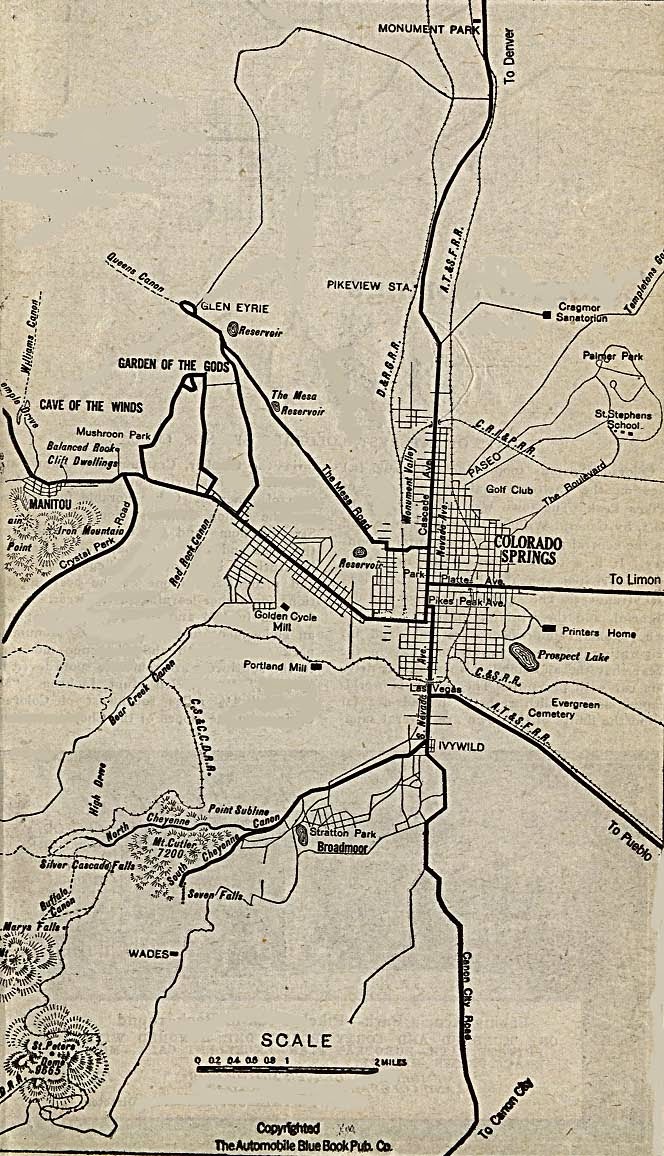I have to admit, and for a second time, to the fact of my having a bit of an old timey photo fetish. This penchant is particularly the case as regards Colorado Springs/Manitou Springs/Pikes Peak region photos. I would chalk this up to having grown up in the area and having memories attached to nearly every nook and cranny of the place. When said nooks and crannies appear in much earlier iterations, whether it be in maps or antique photos, I can't help but dwell on the image.
 |
| 1920's Colorado Springs Map Designed in the "Happy Motoring" Context |
The next thing that grabs me are the words "Pikes Peak Ocean to Ocean Highway." I've never so much as heard such a phrase, and here it looks like its being promoted. I've asked a number of the Springs History cognoscenti whom I know and most say the map is from roughly the 1920's.
The third element that stands out for me is the fact that the "Road to Pueblo" is the self-same road as the one now called, somewhat incongruously, "Las Vegas." What is fun is how organic said Las Vegas is. The simple act of driving from its (near) beginning point on Tejon Ave. reveals some of the meandering, swerving quality of an older road. Indeed, it has the feeling of being on a paved, modern form of some older, organically-wrought wagon route reminiscent of older areas of the country, say the asymmetrical byways one encounters in New England.
 |
| Note "Ivywild" Warrants a Separate Designation |
One also sees the relative prominence of railways that were so common to city life (and life in general) at that time. One can see, the same area which is now a defunct railroad bed where once this railway made its way to the old industrial depots of our town. Signalling the broader (and I think unwelcome) shifts in our culture: while the railroad bed is an artifact and a ruin, the road designed for cars, Constitution Avenue, is traffic-laden. The latter hurtles cars toward the modern travesty, Academy Boulevard. The latter represents--as if consciously designed to do so--the commercially unappealing mediocrity of the automoblile-based culture ("Happy Motoring!"), with mediocre food establishments (can't bring myself to call them restaurants), odd commercial niches (second-hand clothing, tiny repair places), which is to say representatives of those economic backwaters not yet strangled and drowned by the Leviathan Walmart and its vast asphalt prairies of parking. Happy Motoring.
Also on this second map, if one looks just a bit below the central grid that defined Colorado Springs at the time, one sees a name very much in use to this day: Ivywild. But what is now best known as a mixed-use commercial center, "The Ivywild School," was at that time shaping into its own little town or village. In fact, about 20 years prior to the two maps above, the residents of Ivywild met to discuss formation of a local government. There is an article in our paper, the Gazette which refers to the town incorporating (click here for article). Driving through the area, one would never know that this was once a little town just south of Colorado Springs. That's what old maps are for.
Come check out my blog! Lots of fun for peeps who love old maps and/or #ColoradoSprings
#COSprings
— Local Reach Mktg (@localreachmktg) May 5, 2015
To contact Sean Alden Fitzgerald of Local Reach Mktg in Colorado Springs:FB: SeanAldenFitzgerald
Google+: SeanAldenFitzgerald
Twitter: SeanAldenF
Instagram: SeanAldenFitzgerald
Pinterest: SeanAldenFitzgerald
LinkedIn: SeanAldenFitzgerald
About.Me: SeanAldenFitzgerald
Wordpress: SeanAldenFitzgerald
Medium: SeanAldenFitzgerald
Tumblr: SeanAldenFitgerald
YouTube: SeanAldenFitzgerald
No comments:
Post a Comment